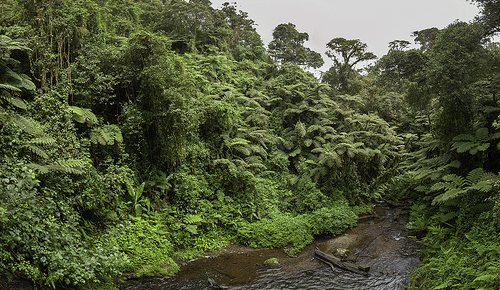La deforestazione nelle regioni tropicali comporta gravi conseguenze ben note per biodiversità, bilancio dei gas serra e depositi (sink) di carbonio terrestri. Al contrario, il disboscamento selettivo delle foreste tropicali è spesso considerato meno dannoso per gli ecosistemi, specialmente nel lungo termine, anche se mancano studi critici e valutazioni al riguardo, in particolare in Africa. In uno studio pubblicato sulla rivista Ecological Research, un gruppo di ricercatori (tra questi, anche A. Di Paola e R. Valentini della Divisione IAFES del CMCC) ha messo a confronto i dati di 501 siti di foreste tropicali in Sierra Leone, Ghana, Camerun e Gabon soggetti a diversi tipi di gestione, come “nessun disboscamento recente (foresta primaria)”, “disboscamento selettivo (fino a 30 anni fa)”, “foreste di ricrescita secondaria post disboscamento (almeno di 20 anni)”.
L’abstract dell’articolo:
Tropical deforestation is well known to have serious negative consequences for biodiversity, terrestrial carbon sinks and the balance of atmospheric greenhouse gases. By contrast, selective logging of tropical forests is often regarded as having a lesser impact on the ecosystem particularly in long terms, even though there have been few critical evaluations of the practice, particularly in Africa. We compared field data from 511 plots in the tropical forest of Sierra Leone, Ghana, Cameroon and Gabon. These plots were subject to different forest management practices: no recent logging (primary forests), selective logging (up to 30 years old) and re-grown secondary forests post clear-cutting (at least 20 years ago). Our findings suggest that the vertical structure and plant richness of the selectively logged and secondary forests change in different amplitude from those of primary forests, but stem density and the prevalence of vine and weed species differ greatly. We show that the effects of selective logging are greater than those expected simply from the removal of commercial species, and can persist for decades. Selective logging, unless it is practiced at very low harvest intensities, can significantly reduce the biomass of a tropical forest for many decades, seriously diminishing aboveground carbon storage capacity, and create opportunities for weeds and vines to spread and slow down the ecological succession.
Leggi la versione integrale dell’articolo:
Gatti R. C. , Castaldi S., Lindsell J., Coomes D., Marchetti M., Maesano M., Di Paola A., Paparella F., Valentini R.
The impact of selective logging and clearcutting on forest structure, tree diversity and above-ground biomass of African tropical forests
2015, Ecological Research, 1-14, DOI: 10.1007/s11284-014-1217-3




